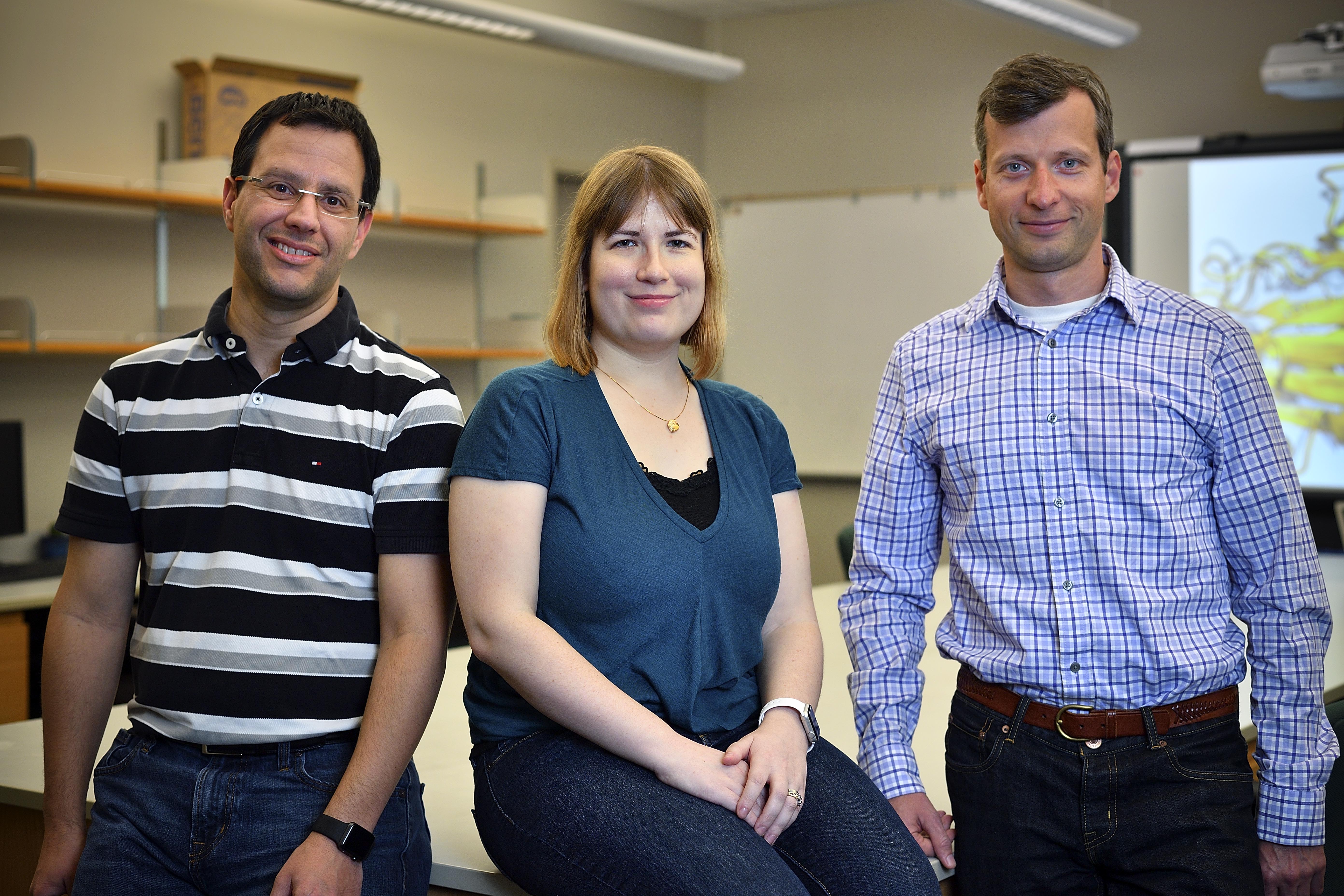DENTON (UNT), Texas -- In the fall of 2016, a young, vibrant and already extremely successful computational chemistry professor named G. Andrés Cisneros came to the University of North Texas. However, he did not come alone.
When Cisneros made the decision to leave his former university in Michigan, he offered his research assistants the opportunity to come with him. Three of his students decided to move across the country to continue their research, and doctoral studies with him at UNT. Now, Pavel Silvestrov, Alice Walker and Erik A. Vázquez-Montelongo are excited to be UNT students and their professor could not be more proud of them.
“They juggle all the projects,” says Cisneros. “I am so lucky to have the student researchers I do. I have to give them all the credit. They are just a great team and I could not be happier to have them.”
The admiration is clearly mutual. The faces of these researchers brighten as they talk about Cisneros, a man they call a friend and a mentor.
“When I met Dr. Cisneros, I wasn’t sure what direction I wanted to go,” says Walker. “He helped me find my direction. He is so funny and has such a great personality and he has been nothing but supportive. I knew I was supposed to continue my research with him. It has not been fun being away from my husband, who is still in Detroit, but our marriage is solid and this research is exciting.”
Silvestrov also says Cisneros helped guide him in into his current line of studies.
“I was trying to figure out my path when I decided to join the computational lab,” says Silvestrov. “I met Dr. Cisneros and he made a very good impression. I went to several interviews and they were mostly more technical and structured, but with Dr. Cisneros I felt a great energy and openness and I got excited. He was doing work in line with what I wanted to do, so I knew that his lab was where I belonged.”
Vázquez-Montelongo even credits Cisneros for helping him to be able to study in the U.S.
“I heard about Dr. Cisneros through another professor I knew in my home country of Mexico,” said Vázquez-Montelongo. “I sent him an email and when I found out he was actually coming to Mexico, I took an 8-hour bus ride to meet him. I’m so glad I did! He is the type of professor who takes care of his students. He likes to see us make progress in our projects and he’s always willing to help you learn new techniques.
Now Alice, Pavel, Erik and Dr. Cisneros are working with other UNT graduate and undergraduate students. They combine their knowledge of computers and chemistry to help in the fight against cancer among many other projects. Just recently, they gained attention for identifying a mutation that may be associated with prostate cancer in African American men.
“The fact that Dr. Cisneros does a lot of work specifically with cancer is amazing to me,” says Walker. “It just never occurred to me before working with him that I could use my computer skills in this way. He’s even helped me work on a project involving pancreatic cancer research, since he knows that is what took my mother’s life.”
Silvestrov is also excited by the research they are doing and the progress being made in their chosen field.
“Cancer is a complex collection of diseases that involve genetic changes including potentially numerous mutations,” says Silvestrov. “It’s an exciting time to be looking into that. The amount of information we are learning about cancer is growing tremendously and we can help it continue to grow with our increased computational technology.”
Cisneros recently received a Compute the Cure grant from the NVIDA Foundation to specifically search for cancer biomarkers and also has a grant from the National Institutes of Health to investigate a family of DNA repair proteins. He says some of the components in the computers they use to do their research are similar to what video gamers use, but says, “We use them for science.” All three researchers say their work has gotten easier since they made the move to UNT.
“The resources we have here are incredible,” says Walker. “I can run computations 10 times, sometimes 100 times faster than ever before thanks to the equipment we have here.”
While this team is tight-knit, they are looking to expand.
“Our work is not defined by the department we are in,” says Cisneros. “We have had successful collaborations in the past, from engineering to biology and it would be nice to have some of those collaborations here at UNT.”





